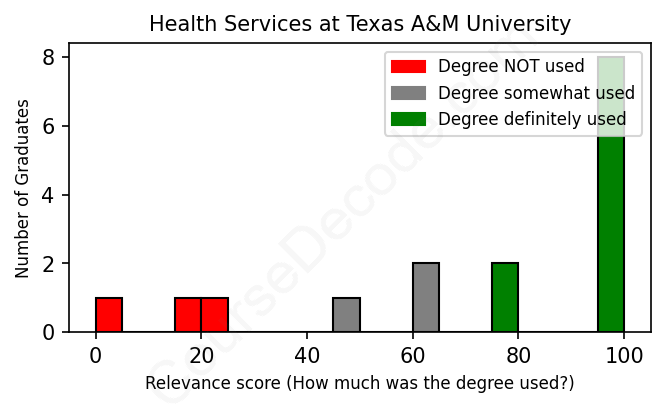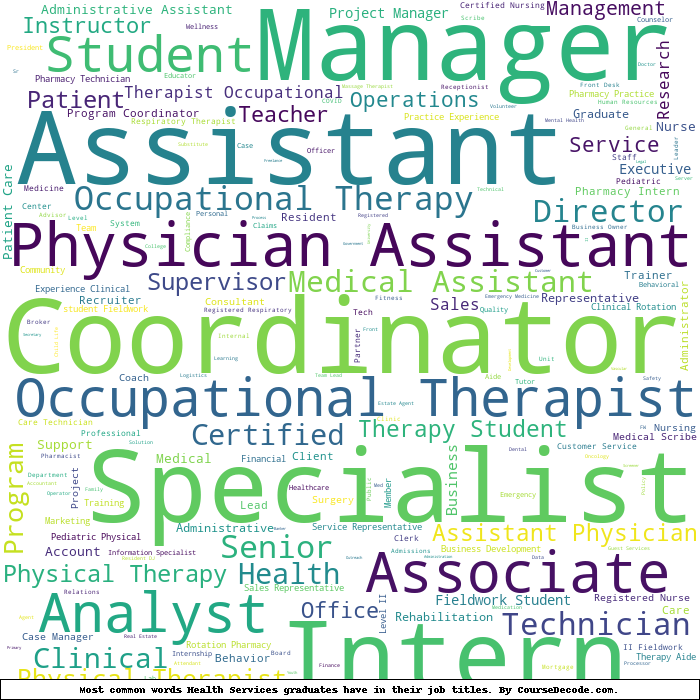
First, some facts. Of the Health Services graduates from Texas A&M University we've analyzed , here's how many have used (or NOT used) their degree in their career:

These are estimates based on AI analysis of 16 LinkedIn profiles (see below).
The verdict? Slightly above average. Overall, with an average relevance score of 72%, Health Services graduates from Texas A&M University have a slightly higher likelihood (+5%) of finding work in this field compared to the average graduate across all fields:
And for comparison, here's the chart for all profiles we've looked at across all degrees.
Also, after graduating, 43% of these graduates have pursued further education other than another Bachelor's degree (such as a Masters degree or other), compared to the average across all profiles of 35%. This suggests you may need more than just a Bachelors degree to be competitive as a Health Services graduate.
See the details:
|
Relevance score: 100% We think this person has gone into a career highly relevant to their degree. We think this person has gone into a career highly relevant to their degree.
DEGREE INFOGraduated in 2017 from Texas A&M University with a Bachelors of Science in Health Services. Also pursued further education since (see below). JOB HISTORY SINCE GRADUATIONPhysical Therapist Memorial Hermann Health System Aug 2020 - Present FURTHER DEGREES DONE SINCE GRADUATINGDoctorateAngelo State University 2017 - 2020 ABOUTNo information provided. |
The top 10 most common jobs done by the graduates we've analyzed (ranked most common to least) are:
When looking at the career paths of Texas A&M alumni with a degree in Health Services, there’s a mix of jobs that either relate directly to healthcare or venture off into other fields. A substantial number of graduates have landed roles that are definitely relevant, like Paramedics, Occupational Therapists, and Registered Nurses. These positions make direct use of the skills and knowledge they gained during their studies, indicating a strong correlation between their education and career paths.
However, there’s also a noticeable portion of alumni who have veered into jobs that don’t really connect back to health services at all—think Sales Consultants, Administrative roles, or even a Business Owner position where health services knowledge isn’t necessary. It seems that while many graduates find fulfilling careers directly within the health services sector, others take their skills in different directions, resulting in a mixed bag of job relevance. Overall, though, if you're passionate about working in health, this degree can definitely set you up for success in that field!
Here is a visual representation of the most common words in job titles for Health Services graduates (this is across all Health Services graduates we've analyzed, not just those who went to Texas A&M University):

Based on the LinkedIn profiles of graduates from the Health Services program at Texas A&M University, it seems that many of them have carved out solid career paths that are largely focused on healthcare and related fields. For lots of these graduates, their first jobs after graduation tend to be internships or entry-level positions within healthcare settings or organizations. Some started off in roles like management interns or community outreach coordinators, while others went directly into health-related positions such as nursing assistants or paramedics. This variety reflects the broad scope of career opportunities available to Health Services graduates.
When we look at where these individuals are five to ten years down the line, we see a trend toward more specialized careers. Many have transitioned into significant roles, such as physical therapists, nurses, or even healthcare data analysts, which showcases their ability to build on their initial experiences to develop specialized expertise. It's clear that Texas A&M health services graduates have a solid foundation that often leads them into meaningful and impactful careers within the healthcare system. While there are a few exceptions where graduates have ventured into unrelated fields, the majority appear to be thriving in careers that are closely linked to their degree. Overall, this suggests that a degree in Health Services from Texas A&M provides a valuable pathway for entering the diverse and rewarding world of healthcare.
Getting a Bachelor’s degree in Health Services at Texas A&M University is generally considered to be moderately challenging, but it really depends on your interests and strengths. The coursework does cover a mix of topics, from public health to healthcare management, which can be a breeze if you're passionate about the subject. However, there are definitely some tough classes and projects that require a good amount of time and effort. If you’re organized and can manage your time well, you’ll probably find it manageable. Overall, it’s not the easiest degree out there, but it’s not the hardest either; it’s all about how much you’re willing to put into it!
Most commonly, in the LinkedIn profiles we've looked at, it takes people 4 years to finish a Bachelor degree in Health Services.
Looking at the job paths of these Texas A&M Health Services grads, it seems like they’ve had a pretty mixed bag when it comes to money. Some folks, like the Physical Therapist and the ER Nurse, are likely pulling in decent salaries since those gigs tend to pay well in the healthcare world. On the flip side, others started out in lower-paying roles like teaching or as caregivers, which probably didn’t stack up as nicely. Overall, it looks like while a few are definitely on the path to making great money, others are still figuring things out—typical of early career paths, really. So, if you're aiming to earn good cash out of college, focusing on in-demand healthcare roles could be a smart move!
Here is a visual representation of the most common words seen in the "about" section of LinkedIn profiles who have a Bachelor degree in Health Services (this is across all Health Services graduates we've analyzed, not just those who went to Texas A&M University). This may or may not be useful:

Here are all colleges offering a Bachelor degree in Health Services (ordered by the average relevance score of their Health Services graduates, best to worst) where we have analyzed at least 10 of their graduates:
| College | Score | Count |
|---|---|---|
 The Ohio State University The Ohio State University
|
88 | 14 |
 Quinnipiac University Quinnipiac University
|
88 | 10 |
 Grand Valley State University Grand Valley State University
|
87 | 16 |
 University of Tampa University of Tampa
|
87 | 10 |
 Stony Brook University Stony Brook University
|
80 | 15 |
 Boston University Boston University
|
79 | 12 |
 University of Connecticut University of Connecticut
|
78 | 26 |
 Florida Agricultural and Mechanical University Florida Agricultural and Mechanical University
|
76 | 12 |
 Texas A&M University Texas A&M University
|
72 | 16 |
 University of South Florida University of South Florida
|
72 | 26 |
 Boise State University Boise State University
|
71 | 11 |
 University of Central Florida University of Central Florida
|
68 | 47 |
 Florida Gulf Coast University Florida Gulf Coast University
|
68 | 10 |
 James Madison University James Madison University
|
66 | 26 |
 University of Missouri-Columbia University of Missouri-Columbia
|
66 | 17 |
 California State University, Fullerton California State University, Fullerton
|
66 | 13 |
 California State University - East Bay California State University - East Bay
|
66 | 10 |
 Arizona State University Arizona State University
|
62 | 10 |
 Cleveland State University Cleveland State University
|
60 | 10 |
 Stockton University Stockton University
|
58 | 12 |